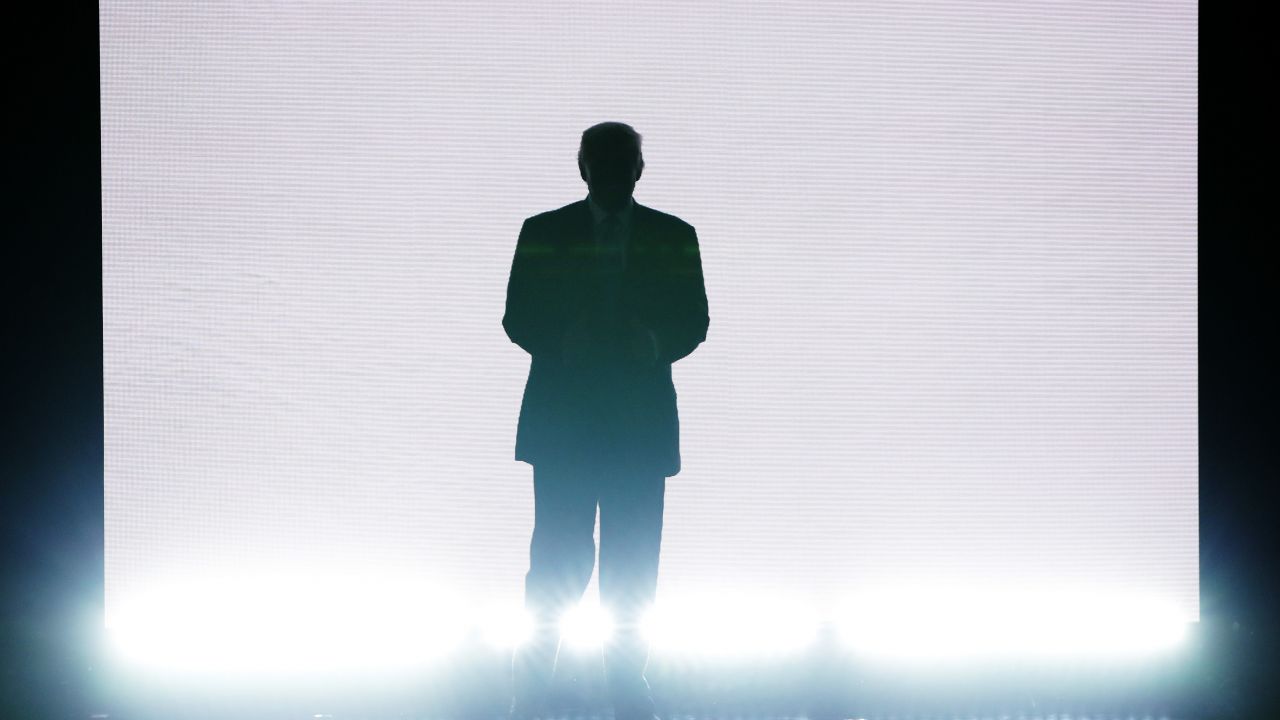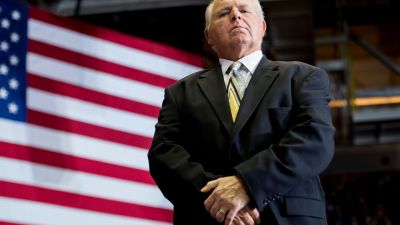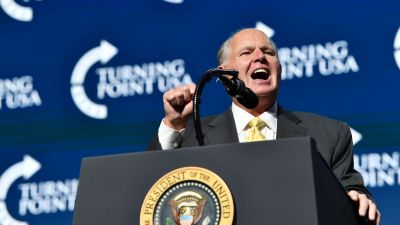
Presumptive Republican presidential nominee Donald Trump walked onstage to introduce his wife, Melania, to the strains of Queen's "We Are the Champions" at the Republican National Convention in Cleveland on July 18. (Photo by Alex Wong/Getty Images)
Democrats usually can be accused of bringing a knife to a gunfight. They did it when the Supreme Court overruled the popular vote in 2000 and shoved George W. Bush into the White House. They did it legislatively on numerous occasions when Republicans outmaneuvered them on everything from a Keynesian recovery package after the recession to gun control to funds to combat the Zika virus. They did it when they sidelined President Obama’s nomination of Merrick Garland to the Supreme Court. You have to hand it to Republicans: They never use a pistol when they have a howitzer at their disposal.
But this election, Democrats might find themselves in a different predicament, one that not only may help explain why so many pundits failed to predict the success of the Trump phenomenon, but that also may explain why Trump might actually win the presidency, despite the odds against him. Because this time the Democrats aren’t just bringing a knife to a gunfight. They are waging a traditional political campaign against an entertainment extravaganza named Donald Trump.
Democrats have to ask themselves: Can politics really beat showbiz?
Until now, presidential campaigns pretty much have been all alike, waged with the same narrative conventions: the VP search; the party conclaves; the post-Labor Day rallies and on-the-stump speeches; the TV commercials, some elevating, most denigrating; and the debates, which really aren’t debates at all but joint press conferences. The process is essentially a long audition, and with a few media tweaks — like shorter speeches — its contours have been similar for decades because our concept of the role for which candidates are auditioning hasn’t changed much. It’s about choosing a person we trust to govern us.
But Trump has accomplished something that no previous major party candidate has done — not Franklin Roosevelt or John F. Kennedy or Ronald Reagan, all of whom were master communicators who understood mass media, how to convey a message effectively, and in Reagan’s case at least, recognized that a major component of politics was making people feel the way the movies made them feel — as if it were “morning in America.”
Still, FDR, JFK and Reagan all ran political campaigns. Trump’s accomplishment is that he is running an entertainment spectacle, complete with commercials. (Remember his tasteless display of Trump products during a victory speech?) This isn’t intended as a criticism of Trump’s strategy. Candidates find what works for them, and this has clearly worked for him. Rather, it’s intended as a way to understand the dynamics of this election, the degree to which they are a departure from previous elections and the degree to which previous political analysis may be outdated.
The media have declared that the themes of this election are white grievance and minority ascendance; the demographics of the young, urban and people of color on one side, and the demographics of the old, rural and exurban and white on the other; as well as how the forces of globalization, immigration and transnationalism have disrupted life and roused anger. Surveys indicate that these are real and manifest tensions.
But they don’t necessarily explain how Trump has managed to blow up the system, and they don’t necessarily predict how the election is likely to unfold. Trump was underestimated by the pundits not because they underestimated the level of white injury in a world that was mutating and escaping their control, or even how Trump could harness that sense of injury. I believe they underestimated him because they underestimated the extent to which his showbiz razzmatazz overwhelmed traditional political campaigning, even as the media themselves were encouraging that razzmatazz. In his case, the medium really is the message.
To begin with, there was a wide disparity between how Trump and his GOP rivals campaigned. The latter were still playing by the old rulebook — acting presidential (or at least their version of presidential), emphasizing their conservative bona fides, declaiming their ability to govern and even laying out plans for governing, setting up field operations and running a ground game. Trump eschewed all of these, even a real campaign organization, on the basis that he doesn’t need them because he has himself. He is the entire campaign, not because he is wise or steady or articulate or experienced, but because he gives us some cheap thrills. With apologies to Cedric, he is Trump the Entertainer.
One shouldn’t downplay just how effective this whole nonpolitical approach may be even in a general election, especially at a time when there is a revolt against the traditional political narrative and style. Indeed, the disparity between Trump and everyone else, perhaps most dramatically Hillary Clinton, is not the disparity between populism and establishment politics, or between recklessness and gravitas or between the spontaneous and the rehearsed. It is between entertainment and politics. That’s what the pundits didn’t grasp because they were used to functioning within a political context while Trump has changed the context to entertainment.
Politics and entertainment occupy very different realms, and they purvey very different values. Politics is about negotiation; entertainment about assertion. Politics is messy; entertainment clean and bold. Politics is serious; entertainment generally frivolous. Politics, theoretically at least, appeals to reason; entertainment to emotion. Politics is about decision-making; entertainment about… well, about entertaining.
This duality couldn‘t be more germane. Clinton, a politician, is dull, wonkish, nuanced, deadly earnest, reliably competent — which are about the last adjectives you would apply to a prospective entertainer. And Trump? Trump is, if nothing else, exciting. He is a walking time bomb.
We aren’t accustomed to thinking of campaigns this way, as antidotes to boredom. But in a world of constant stimulation, a world where most people can’t stop texting for a single second, boredom has come to play an ever larger role both in our daily and our political lives. Two recent studies in Europe found that individuals high on the boredom scale tend to gravitate toward political extremes.
This shouldn’t be too surprising. People who are bored want excitement. That has always been one of the chief appeals of entertainment — as a way out of the daily grind. The great director Frank Capra once said, “There are no rules in filmmaking, only sins, and the cardinal sin is dullness.” Capra’s dictum might now be applied equally to politics.
Trump has said as much. Senate Majority Leader Mitch McConnell (R-KY) recently described on CNN how he suggested to Trump that to stay on message while speaking to the NRA convention the candidate should read from a teleprompter. Trump shrugged it off because, he said, that would be boring. Even his VP selection process was described by CNN as a “thriller.” Anything to keep the audience — and not incidentally, the media — revved up.
Trump has made one additional and important discovery besides realizing that to large segments of an increasingly jaded electorate, an unscripted, improvisational, no-holds-bar show would be more appealing than the ordinary political palaver. He recognized that politics aren’t the best channel for those aggrieved whites to whom he appeals. Politics are too feckless. Entertainment is a much blunter instrument, a much better way to vivify those resentments with wild accusations, showboating, insults, chest-thumping machismo and of course, red-faced anger, even mixed in with a little sexual bravado. If that sounds like a movie, it is. Just about every blockbuster now — every superhero movie, certainly — is about muscular vengeance.
Many Democrats are sanguine about Clinton’s electoral prospects, regardless of what the tightening polls now say and what favorable demographics portend. They shouldn’t be. While Trump may believe in nothing so much as his own narcissism, and while he barely has put together a campaign organization, he appreciates the power of entertainment to usurp and ultimately defeat politics in a society that favors the first over the second. The only thing he has going against him is that he is a novelty act, and novelty often wears thin.
Still, overcoming the resentment of aging whites may be the easy part for Democrats. Overcoming the thrill of an ongoing show with a protagonist who resembles The Joker and who manages to whip up anger and foment chaos in a puree of pulse-racing excitement may be a much more difficult task. What Hollywood movies have giveth, Trump has taketh and runneth with. Get out the popcorn.




